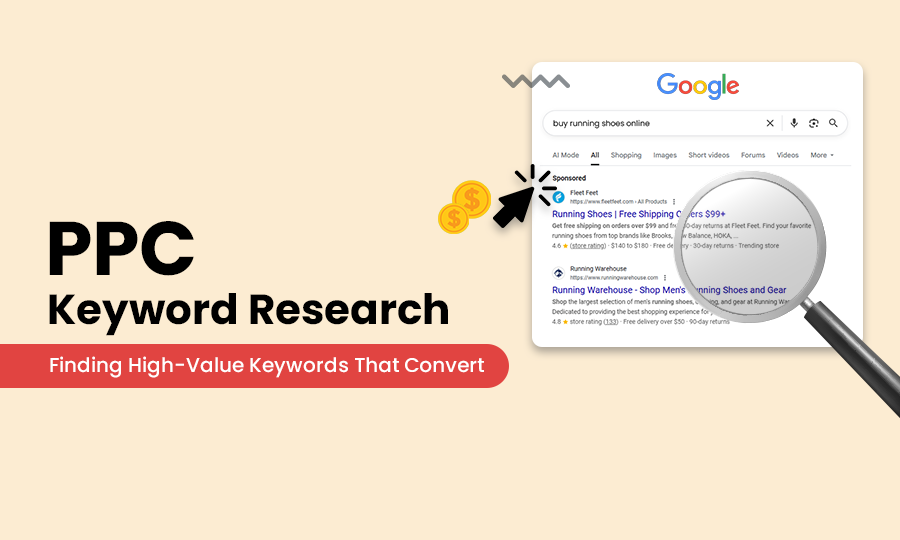Almost 80% of businesses use Google Ads to grow their business online. For every dollar they spend, they get 2 dollars back, which is a 200% return on investment. This is a clear indication of the effectiveness of Google Ads in generating revenue for businesses. Google Ads is a form of PPC (pay-per-click) advertising. When you implement PPC ads, it means you pay only when someone clicks your ad, not just for displaying. Though there are widely popular PPC ads, like Microsoft Ads, Facebook Ads, and Amazon Ads, almost 63% of people have landed on a Google ad.
PPC helps your message get to the right people at the right time in the world. When your campaigns start, your ads show up on the first page of search results, and customers who are ready to buy can click on them. PPC traffic has a 50% higher conversion rate than organic traffic, which explains why 65% of small to mid-sized businesses run PPC campaigns. This simple statistic highlights one truth: effective PPC keyword research isn’t optional—it’s mandatory.
Furthermore, when you start your first PPC campaign, you need to mainly focus on finding out your objective and its related keywords. Then, pick what you want: sales, leads, or traffic. After that, choose high-intent keywords that are relevant to your audience.
In this guide, you can learn how to select your goal for ppc ad campaigns and what the best keyword research tools are to find the most relevant keywords.
What is PPC Keyword Research and Why Is It Important?
Your target audience uses some specific words to find your products or services. And these words are very important for PPC campaigns. So when you run PPC campaigns, you need to find out those specific keywords to reach a wider audience. The keywords should have high search intent, meaning they indicate that the user is ready to take action, so you have to plan your PPC keywords and research accordingly.
For instance, A shoe business running advertisements with the phrase “buy running shoes online” will reach those who are actively looking to buy, not simply browse.
However, PPC is prohibited or severely limited in China (Google Ads is banned, but Baidu is permitted with restrictions), North Korea, and Iran (due to sanctions). In Middle Eastern countries, advertising for gambling, alcohol, and adult material is also strictly regulated.
Other Common Names for PPC Ads
- Paid Search Ads (Google Ads, Bing Ads)
- Search Engine Marketing (SEM) ads(Paid placement in SEM ads brings instant traffic to websites because they are targeted and can be tracked. They show up above or next to organic search results.)The best sem tools can be SpyFu,iSpionage, and Adalysis. You can optimize SEM with these most helpful but not so known by many people.
- Sponsored Ads (often shown in search engines and social media)
- Display Ads (banner-style PPC ads on websites)
- Shopping Ads (Google Shopping / Product Listing Ads)
- Social Media PPC Ads (Facebook Ads, Instagram Ads, LinkedIn Ads, X Ads)
- Remarketing/Retargeting Ads (PPC ads shown to people who already visited your site)
Platform Comparison at a Glance
| Platform | Typical ROAS Range | Best Suited For |
| Google Ads | ~2x–8x; up to 10–20x (PMax) | High-intent search, fast conversions |
| Microsoft Ads | ~$4–10 per $1 (efficient ROI) | B2B, desktop users, cost-sensitive campaigns |
| Facebook Ads | ~2.5x–8x; retargeting can exceed | Visual products, branding, long-funnel conversion |
| Amazon Ads | ~3–5x (avg. 4.2x); up to 45x | Sellers targeting high-intent buyers |
Top 5 Benefits of PPC Keyword Research
- Better Keyword Selection
PPC keyword research will help you select the right keywords for your campaigns. Your users are ready to click and convert if you identify high-intent target keywords. If you want to reduce your advertisement budget and get a better return on investment, you have to find keywords wisely.
- Reach Your Target Audience
Your ads will reach the right people if you focus on keywords that your potential customers use. This gives you higher involvement and more conversions compared to random ad placements.
- Improve Paid and Organic Search Performance
You can improve both paid ads and organic search results with the perfect keyword research. Moreover, you need to find out keywords related to your business that work well in SEO, helping your website rank higher.
- Identify New Opportunities
Through pay-per-click research, you can uncover high-volume keywords for your items or services that you hadn’t considered. This opens doors for new campaigns, new audiences, and unknown markets.
- Optimize Ad Copy and Landing Pages
You can write more relevant ads and make landing pages that match search intent if you know which target keywords work best. This increases Quality Score, CTR, and conversion rates.
What’s The Difference Between SEO and PPC Keywords?
- PPC = Fast, targeted, paid traffic → best for quick sales, product launches, or competitive markets.
- SEO = Sustainable, trusted, organic traffic → best for long-term brand growth and credibility.
- Best Strategy = Use both → PPC for short-term wins and SEO for sustainable long-term growth.
| Factor | PPC (Pay-Per-Click Advertising) | SEO (Search Engine Optimization) |
| Definition | A paid marketing model where businesses bid on keywords and pay only when users click their ads. | A process of optimizing a website to rank higher in organic (non-paid) search engine results. |
| Cost | You pay for every click (CPC varies by industry/keyword). Costs stop when you pause campaigns. | Free clicks, but requires investment in content, technical optimization, and time. |
| Speed of Results | Immediate – ads show as soon as campaigns are live. | Slow – can take 3–6 months (or longer) to see significant results. |
| Traffic Volume | High but temporary; traffic stops once the budget runs out. | Sustainable; traffic continues as long as rankings are maintained. |
| Click-Through Rate (CTR) | Often lower because users know they’re ads. | Typically, higher users trust organic results more. |
| Conversion Rate | Higher (PPC traffic is often 50% more likely to convert). | Moderate; depends on ranking and content quality. |
| Targeting Options | Very advanced: demographics, devices, locations, time, audience intent, and remarketing. | Limited to optimizing content and relying on user searches. |
| Control & Flexibility | Full control over keywords, bids, ad copy, and landing pages. | Less direct control; depends on algorithms and optimization efforts. |
| Credibility & Trust | Seen as promotional, less trusted compared to organic results. | Builds authority and long-term credibility with users. |
| Scalability | Scales quickly by increasing ad spend. | Scales slowly; requires consistent effort and authority building. |
| Best For | Quick sales, product launches, promotions, and testing keywords. | Long-term growth, brand building, and sustainable visibility. |
| ROI Timeline | Short-term ROI can be tracked daily/weekly. | Long-term ROI, compounding benefits over time. |
| Dependency | Depending on the budget, it stops once you stop paying. | Independent of the budget once established, but requires ongoing work. |
| Learning Curve | Requires knowledge of ad platforms (Google Ads, Microsoft Ads). | Requires SEO skills: on-page, off-page, and technical SEO. |
Who Needs to Do PPC Keyword Research?
PPC keyword research is not limited to large corporations. Anyone who advertises with money ought to do it.
Here’s who needs it most:
- Small businesses—to reach local customers quickly and compete with bigger brands.
- E-commerce stores—they need to find buying keywords that bring sales for products.
- Startups—for quick traffic and product-market fit evaluation.
- B2B businesses—to go after people in charge who are looking for software or services.
- Service providers—like doctors, lawyers, or home repair experts who need local leads.
- Businesses and advertising agencies— to run client ads and help them get a better return on their investment (ROI).
- Content creators—high-intent keywords are best for promoting courses, eBooks, or online programs with
- Retailers—to publish your ads for new products, seasonal deals, or discounts.
- Enterprises: they can outperform rivals in sponsored search and safeguard brand keywords.
Furthermore, anybody running PPC advertising should do keyword research to save money and get better outcomes.
How to Conduct Effective PPC Keyword Research (Step-by-Step)?
Before we go to the best tools to find new keyword ideas, you should know the foundation steps. Those are the following, so take these steps very carefully for selecting keywords.
- Campaign Goals and Budget
First, you need to set campaign goals before you start any pay-per-click (PPC) campaign. You have to understand your business needs, like what you want- website traffic, leads, or direct sales?
If you have precise objectives for your campaigns, then you can determine your budget and also the bidding strategy. A PPC bidding strategy tells you how much to pay for each keyword click. It will help you in ad spend management, audience targeting, and campaign objectives like traffic, leads, and sales.
PPC Bidding Strategies Comparison
| Bidding Strategy | Best For | Pros | Cons |
| Manual CPC | Small budgets, full control | Direct control over keyword bids, simple to manage | Time-consuming, risk of overspending if not monitored |
| Maximize Clicks | Driving website traffic | Quick setup, brings more visitors fast | May bring low-quality clicks, not focused on conversions |
| Target CPA (Cost per Acquisition) | Lead generation | Optimizes for conversions, efficient use of budget | Needs conversion data to work well |
| Target ROAS (Return on Ad Spend) | Revenue-focused businesses | Maximizes profit by focusing on return | Works best with large data, can limit traffic |
| Enhanced CPC (ECPC) | Balanced campaigns | Adjusts bids automatically for better chances of conversion | Less control than manual CPC |
| Maximize Conversions | Conversion-heavy campaigns | Uses automation to drive more sales or leads | Requires a strong budget and accurate tracking |
You must determine how much you are willing to spend each day or each month after you have defined your goals. The competition in your industry and your anticipated return on investment should be reflected in your budget. For example, highly competitive industries may require a larger budget to achieve results.
The most important part of budget planning is identifying keywords. So you can use keywords that are relevant to your objectives, such as broad keywords for brand awareness or high-intent keywords for conversions.
- Brainstorm to Find New keywords
After setting the goal, the second step in PPC keyword research is brainstorming. It is important to consider the terms that your target market will use to search for your product or service on Google or other search engines.
Therefore, you can begin with seed keywords. These are the fundamental terms that best describe your company, goods, or services. For example, if you sell organic skincare products, your seed keywords could be “organic face cream,” “natural skincare,” or “best organic moisturizer.” From these seeds, you can generate more keyword ideas. Keyword organization can lead to higher Quality Scores, which helps improve ad rankings and reduce costs per click.
Here are some simple ways to brainstorm:
- Product Keywords: These keywords are actually related to what you sell, such as “buy vegan night cream.”
- Problem/Solution Keywords: According to the issues your clients run into. Example: “shoes for knee pain.”
- Branded Keywords: Incorporate your company name or competitor brand names, such as “Nike running shoes” or “Adidas sports shoes.”
- Competitor Terms: Examine the rival’s phrases that they are using in their advertisements. Tools like SEMrush or Ahrefs can help.
You will find a lot of new ideas if you mix these groups. Start with seed terms and then add to them.
- Analyze Keywords Metrics
You can’t simply include every potential keyword on your list in your campaign. You need to analyze keyword metrics to choose the most effective PPC keywords.
Some key metrics to check are
Search Volume:

The number of monthly searches for this keyword. Although a high volume indicates more traffic, there is usually more competition.
- Balance high and low volume: Don’t only pick very high search volume keywords. They are costly and competitive. Mix them with medium and long-tail keywords.
- Use phrase match options: Instead of chasing only exact high-volume terms, use phrase match to capture relevant search traffic at lower costs.
- Seasonal keyword check: Search volume changes with seasons. Always review Google Trends or tools to match campaigns with peak demand.
Cost Per Click (CPC):
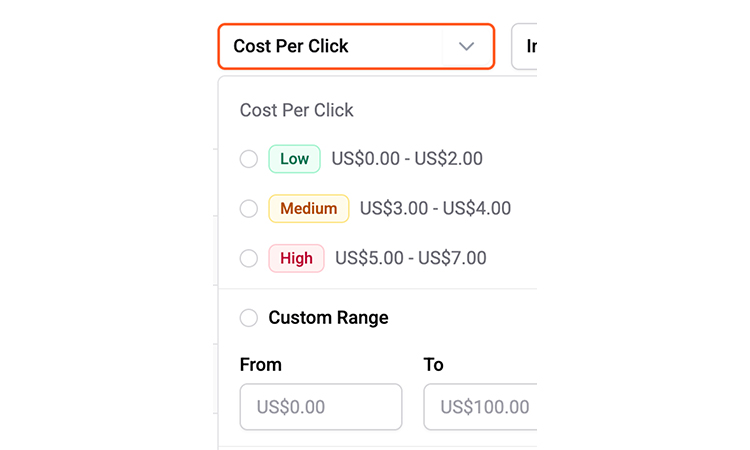
The average price you will pay when a user clicks on your advertisement. You can match your budget because some keywords are pricey.
Competition Level:
The number of other advertisers bidding for the same keywords is visible. If there is a lot of competition, you might need more money. High competition = higher cost.
Search Intent:

Very important. Ask, “Is the user ready to buy, or just looking for information?” Select keywords that have a high intent to buy for improved conversions. You can emphasize buyer keywords that show strong commercial intent, such as “buy running shoes online.” These phrases match Keywords, suggesting the user is ready to convert, raising your chances of sales or leads.
In PPC keyword research, prioritize Transactional + Commercial keywords for ROI, but also keep Informational + Navigational to build brand awareness.
| Search Intent Type | Definition | When to Choose in PPC | Example Keywords |
| Informational | The user wants knowledge or answers, not buying yet. | Choose when running awareness campaigns, blogs, or educating the audience before purchase. | “What is organic skincare?” |
| Navigational | The user is searching for a specific brand, website, or product name. | Choose if you want to capture branded traffic or redirect to your site. | “Sephora skincare products” |
| Transactional | The user is ready to buy or take action (high intent). | Always choose PPC when aiming for sales and conversions. | “Buy organic face cream online.” |
| Commercial Investigation | The user compares options before purchase (medium-high intent). | Choose when targeting people researching products/services to influence their buying decision. | “Best organic skincare brands” |
Relevance:
Then, you need to validate that the term fits your service or product. If a lot of people look for something, but the buzzwords aren’t useful, you’ll lose money.
- How to categorize by match type & ad group?
Once you’ve chosen your keywords, you need to adequately place them. This is done through match types and ad groups.
Match Types
You can change how closely a user’s search must match your keyword with Google Ads’ different match types:
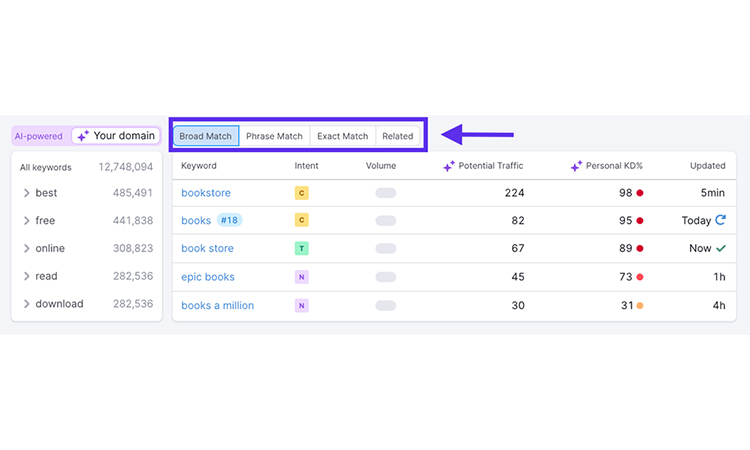
- Broad Match: Your advertisement appears for keyword-related searches. Example: if your keyword is “running shoes,” your ad may show for “best jogging footwear.” These broad match keywords give your brand greater visibility but may result in unrelated clicks.
- Phrase Match: Your ad shows when the search matches the keyword phrase in the same order. Example: “Buy running shoes online.”
- Exact Match: Your ad will appear only when the search aligns with your keyword. Example: keyword = [running shoes], search = “running shoes.”
- Negative Keywords: These keep irrelevant searches from showing your ad. Example: adding “free” as a negative keyword if you only sell paid products.
Categorizing Search Terms into Ad Groups
An ad group is a group of keywords and ads that are part of the same campaign. You can get good results from your ads by putting your keywords into existing ad groups or making new ones.
Tips to categorize keywords:
- You need to put together the same keywords by theme. Example: put all “buy running shoes,” “cheap running shoes,” and “best running shoes online” into one ad group.
- Then you can keep ad groups small and specific. You should only focus on one theme in each ad group.
- If you have new keyword ideas, you can create a new ad group rather than adding irrelevant keywords to an already-existing one. This keyword will make your PPC campaigns organized.
- Ensure that every ad group has its own ad copy. You should create ads that match the keywords within the group. For example, if your ad group is about “women’s running shoes,” your ad headline should mention “women’s running shoes.”
- How to Use Negative Keywords Effectively?
Negative keywords are very important in PPC campaigns. They keep your ads from showing up for useless search terms. You save money and achieve better outcomes as a result.
When you do thorough PPC keyword research, you not only find the best target keywords but also recognize search terms that should be excluded. For example, if you sell “organic beauty cream,” you can add negative keywords like “free,” “cheap,” or “DIY.” This way, your ads only show to people who are ready to buy.
Steps to Use Negative Keywords Properly:
- First, you need to track negative keywords in your Google Ads account frequently.
- If you want to know which search terms waste your time and money, check out negative keywords.
- You can make your ads better by adding them to an existing group.
- Keep your list updated as search traffic develops.
You can take help from Google’s keyword planner to implement negative keywords
Select “Campaigns” > “Audiences, keywords, and content” > “Keywords.” Then go to the “Negative Keywords” tab.
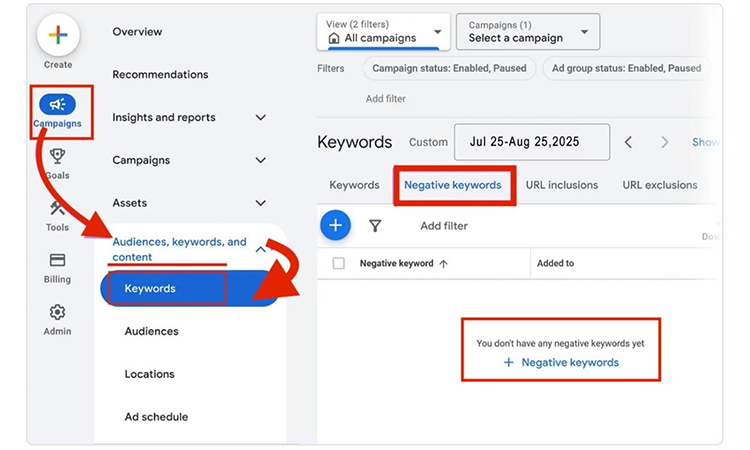
Select if you want to apply negative keywords to the whole ad campaign or a single ad group. Then insert your negative keywords. Click “Save.”
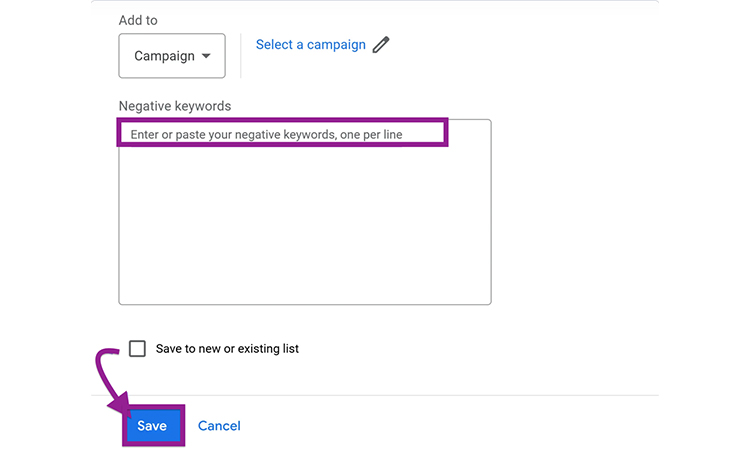
- How Is A Landing Page Significant For PPC?
A landing page is what connects search terms to successful conversions. Even the best PPC advertisements may not work without it. A well-optimized landing page increases conversion rates by 2-5x compared to generic pages. Successful PPC campaigns require careful categorization of keywords into separate campaigns with specific landing pages. It will make your PPC campaigns more successful.
Steps to Create Effective PPC Landing Pages
- Keyword Alignment—First, you need to align your landing page content with targeted search terms from your PPC ads. To keep your content relevant and raise your Overall Readability Score, naturally use your main keywords in headlines, subheadings, and body text.
- Compelling Headlines—Then write catchy headlines that embrace your main keywords and show what people are looking for. So, visitors know they’ve found what they’re looking for.
- Clear Value Proposition- In five seconds, make your unique selling proposition clear. Your writing should be very precise about your services or products. And try to incorporate those words that your target audience uses to find any specific products.
- Focused Content—Your content should be simple and relevant to the PPC campaign. Eliminate any navigational components that might subtract from the main conversion objective. Moreover, each component should direct readers to your call to action.
- Strong Call-to-Action (CTA)— After that, the most important part is to use action-oriented language in buttons and forms. Your call to action (CTA) should stand out and be related to what the searcher was looking for when they used those specific words.
- Mobile Optimization—Most of your target audience is using their mobile phones to search for your services. You need to create a landing page suitable for mobile devices, as well as tablets and desktops. Most of the PPC clicks are coming from mobile searches. It also changes the Quality Score based on how Google indexes mobile sites.
- Trust Signals—If you want better results, you have to include testimonials, reviews, security badges, and guarantees to establish a reputation and reduce conversion friction.
- A/B Testing—Test several variations often to maximize for higher conversion rates and lower PPC expenses.
Most Important 10 Keyword Research Tools For PPC
In this segment, I give you the top 10 best ppc keyword research tools to find new keywords for your PPC campaigns. You can find the most popular keywords with these keyword tools.
You already know which factors to keep in mind before conducting keyword research for PPC campaigns.
Therefore, I am showing keyword research tactics for a beauty brand. You can use this PPC keyword research technique for any sector, any product, or service. Remember, these are techniques, not the actual seed keywords. You have to find your brand seed keywords and then use these tools to expand your keyword list and find relevant keywords that will attract targeted traffic to your website. However, you can employ these tools to optimize your PPC campaigns and improve your overall ROI.
- Google Trends / Suggest (Autocomplete)
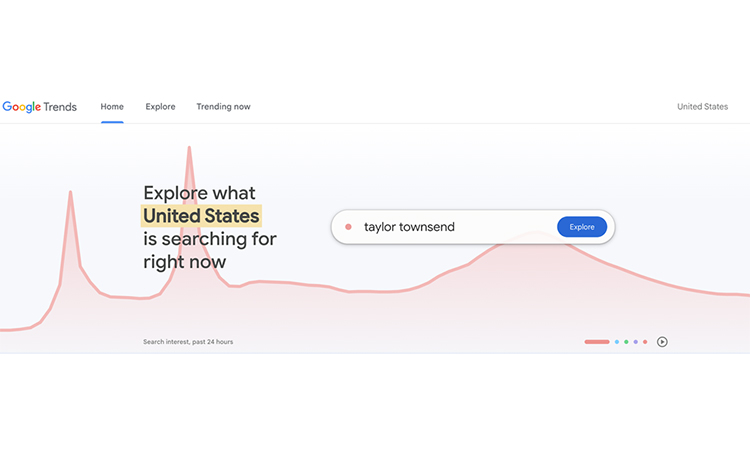
In my PPC tools list, my first suggested tool is Google Trends. With this tool, you can find the most relevant keywords related to your service or products. Being a business owner, you should know what new trends are going on related to your products. So you can incorporate those search terms into your campaign and website.
Suppose you have a beauty brand, so what can your target audience search for? Their search terms can be “best skincare products,” “organic beauty products,” “anti-aging cream,” “cruelty-free makeup,” or “hair growth serum.” You can get your seed keywords according to your business. And then you have to follow these strategies.
First step is to put the main keyword, like “best skincare products”, in the Google Trends search bar, like this-
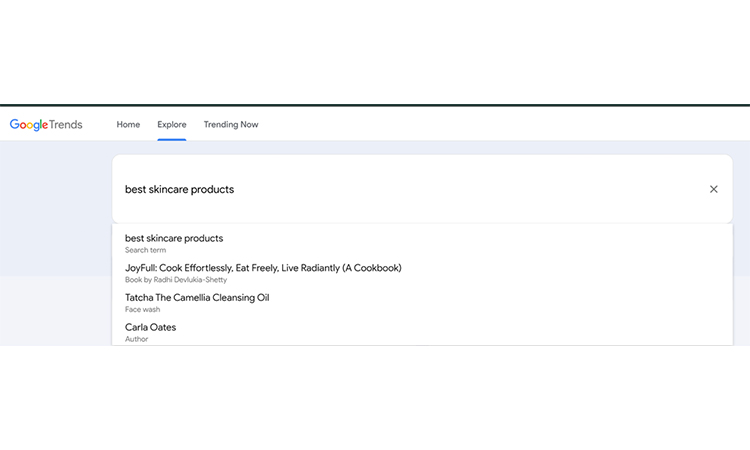
And then you get these graphs, where you find how many specific terms are used and so on. Google Trends shows the number of searches for a keyword on a scale from 0 to 100, where:
- 0: No interest or very few searches
- 100: Peak popularity during the selected time frame
This comparative scale compares a keyword’s current popularity to its peak in the given time period and area. It doesn’t give exact numbers for search volume.
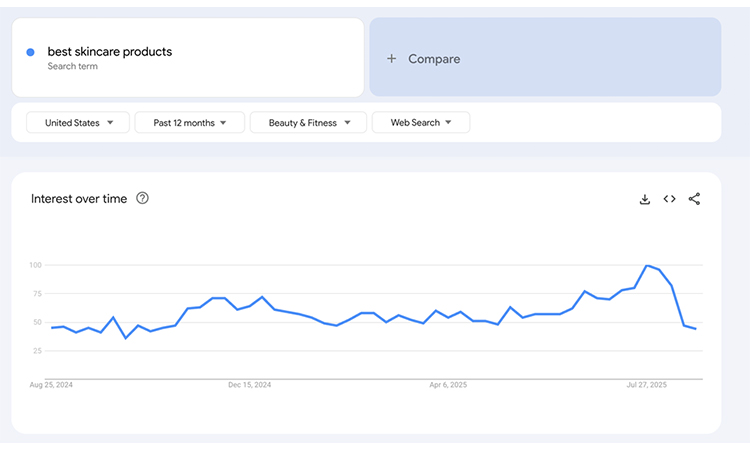
Interpreting the Graph
- Peaks: Signify times when the keyword experienced maximum interest.
- Valleys: indicate times of low interest or seasonal drops.
- Trends: The lines indicate interest changing over time.
For example, the number of people searching for “Korean skin care” might go up when it’s back-to-school time and down when it’s summer. Google Trends also shows you where a keyword is most popular by region. This can help companies make their marketing more successful in certain places. You can search for specific regions. When you create a particular landing page for different areas, you can use these ppc keyword research techniques to get better results.
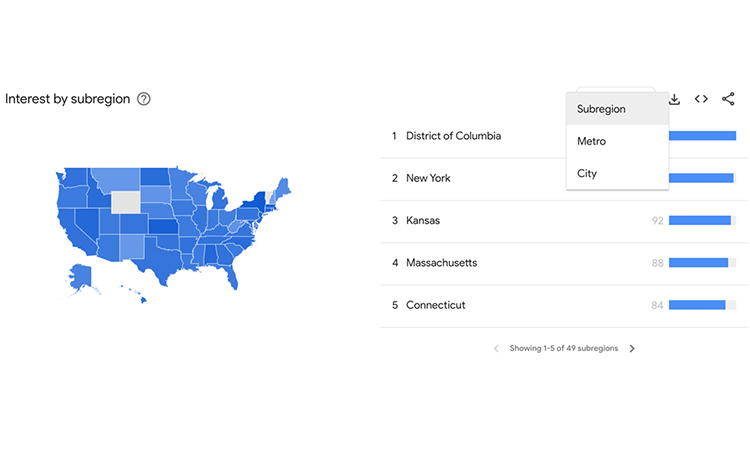
Here you get a keyword list for your products. You can organize keywords according to your business.
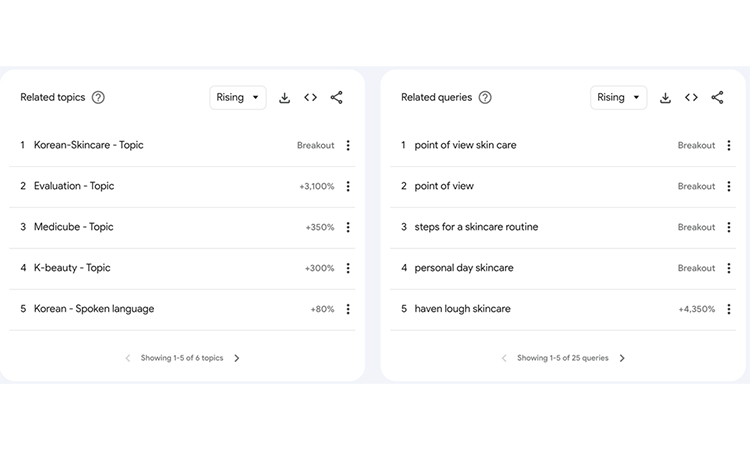
Even though Google Trends doesn’t give exact numbers for search volume, it does help find:
- Rising Trends: New keywords are increasing in popularity.
- Seasonal Patterns: Keywords with predictable interest cycles.
- Regional Variations: Search terms common in specific areas.
Then you can use Google autocomplete like this-
Write your seed keyword in the Google search bar, and let Google show you related results to your search terms-
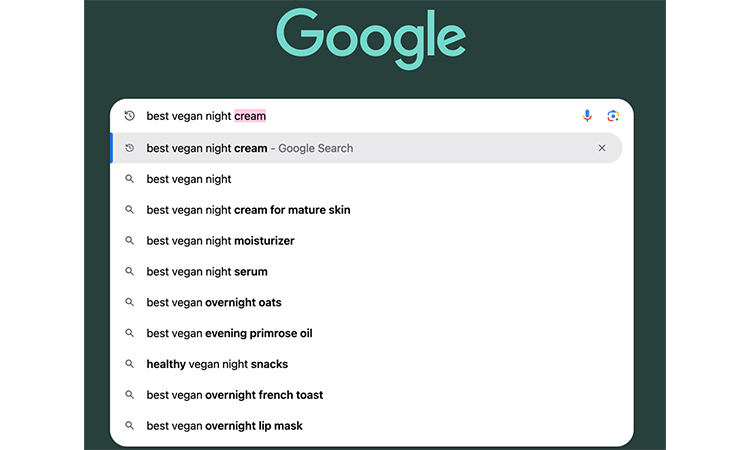
- Google’s Keyword Planner
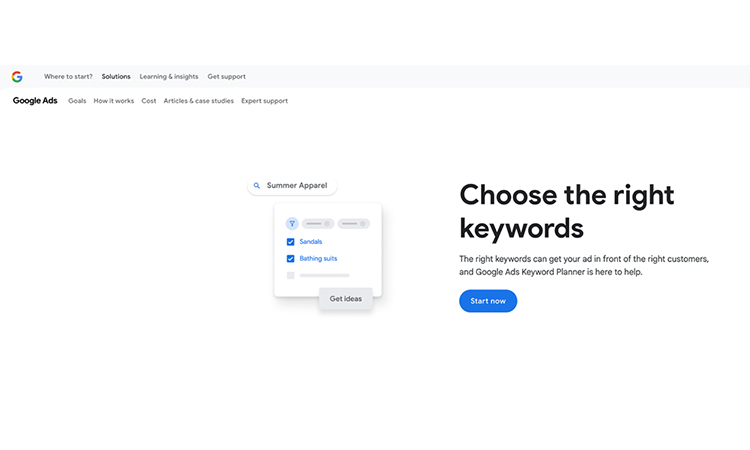
The second free keyword tool is the most famous Google Ads keyword planner. You have to have a Google Ads account to run your ads on Google. So, every Google Ads campaign you run—whether search, display, or shopping—is part of the PPC advertising model. Google Ads helps organizations to produce these ads that display on Google search results, YouTube, or other Google partner sites. Google Ads now has an 80.20% share of the PPC market. So you need to optimize your Google Ads account for better traffic.
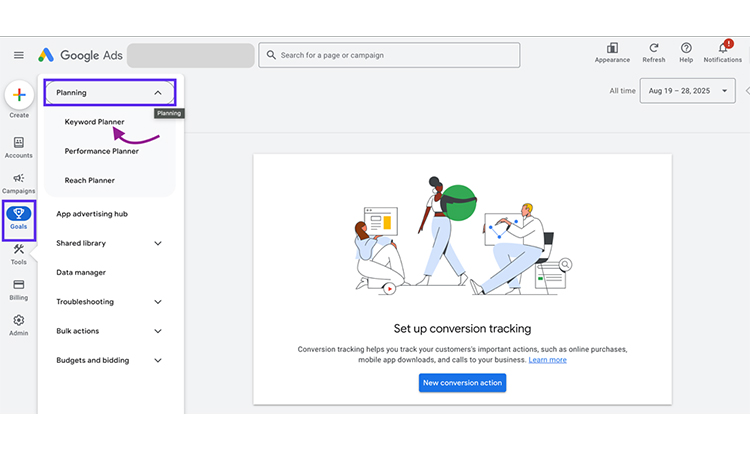
Keyword planner->Discover new keywords-> write your keyword or website URL
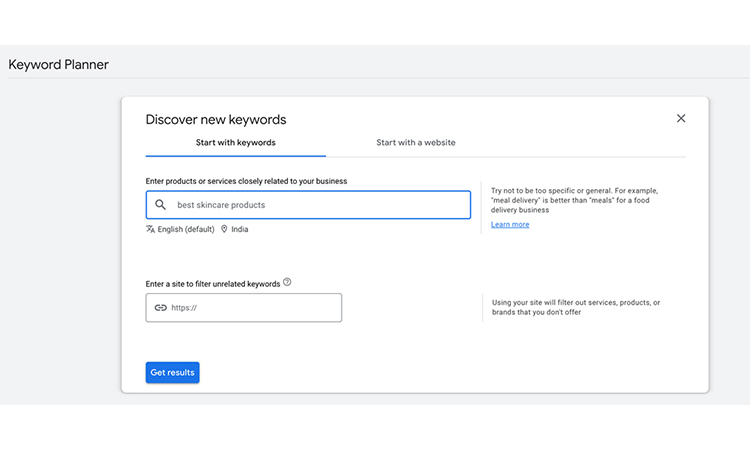
And then you get a full keyword list, and then you can choose keywords as per your requirements.
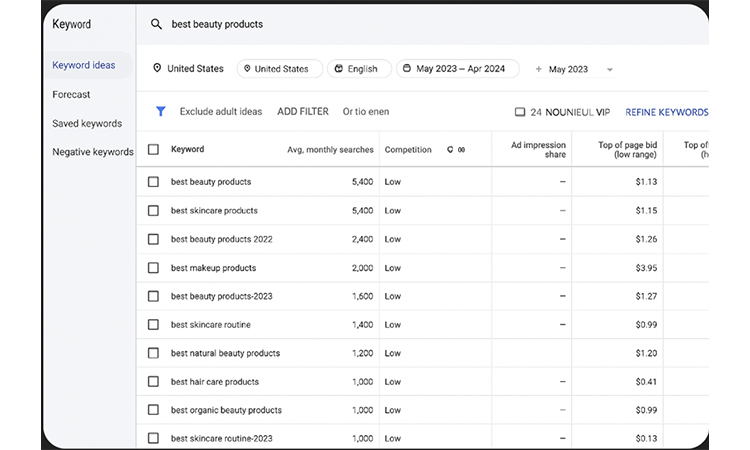
- Semrush (Keyword Magic Tool, Advertising Research)
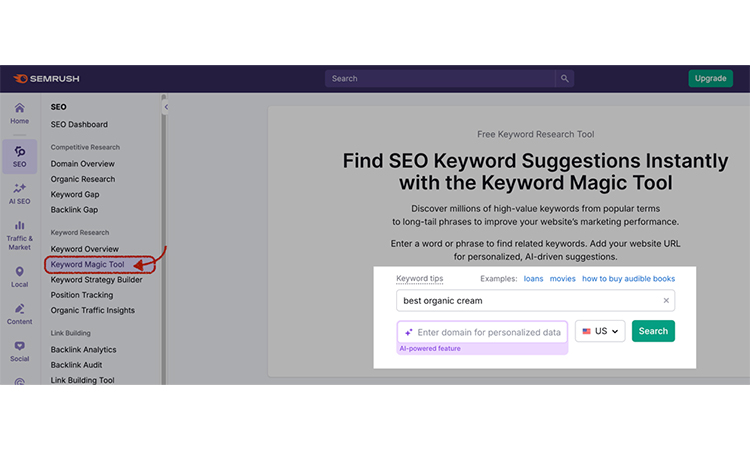
Semrush is the most useful keyword planner tool. In this tool, you get all keywords related to your ppc ad campaign. Most of the ppc marketers use this tool to generate a new keyword list.
You need to add your seed keyword to the keyword Magic Tool. And then you can get all the right keywords with exact match and broad match keywords. Long-tail keywords tend to be less competitive and less costly, making them beneficial for PPC campaigns.
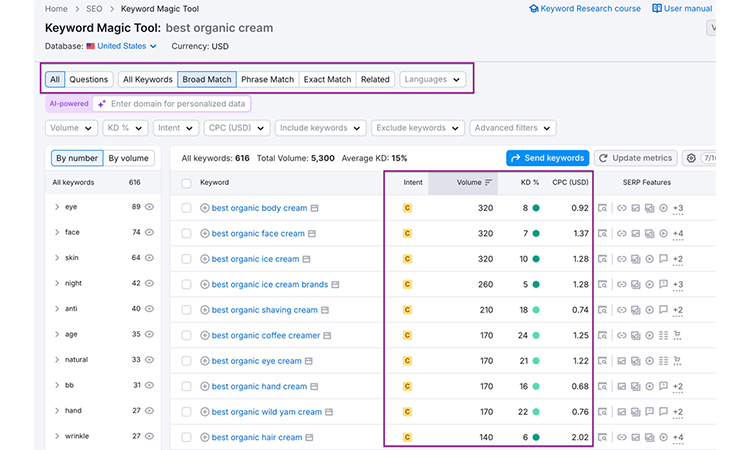
You can analyze your competitor’s PPC keyword research
Only ppc keyword research is not the key to ppc success; you need to analyze your competitors’ keywords. So you can use Semrush’s Advertising research tool.
You can incorporate your competitor’s domain and get all the keywords they benefited from. If you didn’t use those keywords earlier, use them now.
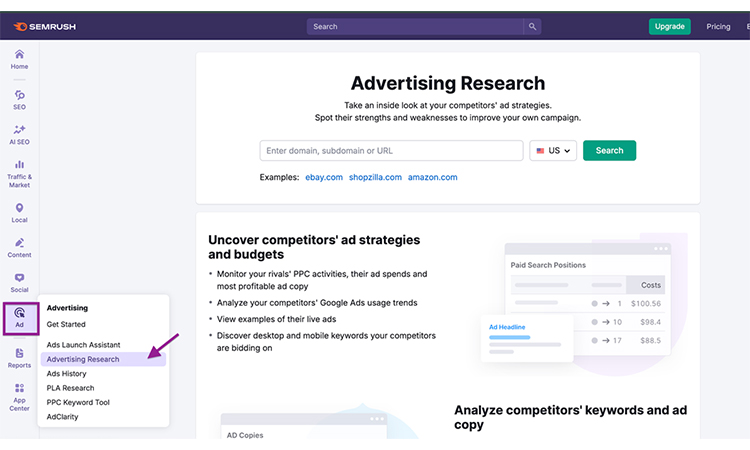
- Soovle
This tool helps you find the best keyword research for Google, Bing, Amazon, YouTube, and more. You just need to put your seed keyword in the search bar and let the magic happen. It will give a detailed keyword list for various search engine platforms. This is one of the best keyword research tools.
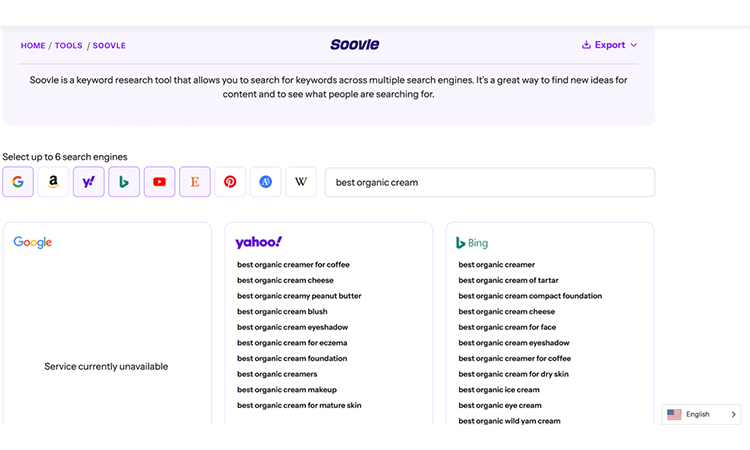
- Ubersuggest
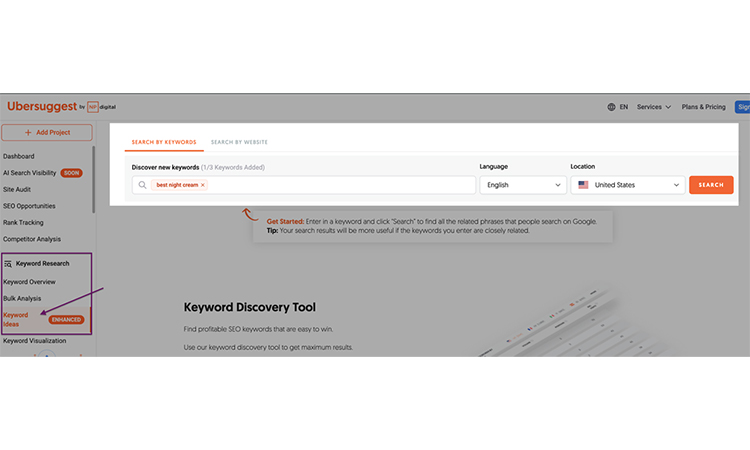
One of the greatest PPC keyword planner tools is Ubersuggest, which offers comprehensive keyword ideas, search volume, CPC information, and competition level all in one location. It helps marketers find long-tail PPC keywords that have a lot of buyer intent, which makes their campaigns more profitable. It has keyword suggestions, competitor analysis, and content ideas, so businesses can easily find target keywords that match their PPC goals. The tool also highlights seasonal trends, so ad spend is targeted at the right time.
Go to “Keyword Ideas” and find your perfect keyword list-
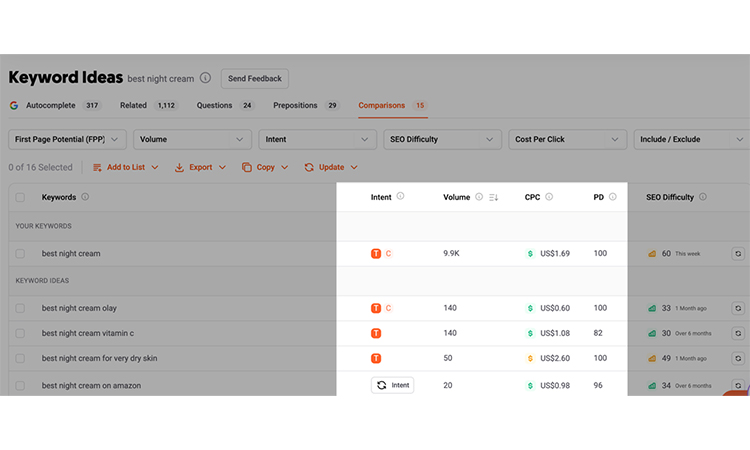
- keywordtool.io
KeywordTool.io is ideal for PPC keyword research because it produces thousands of long-tail keywords from Google’s autocomplete suggestions.
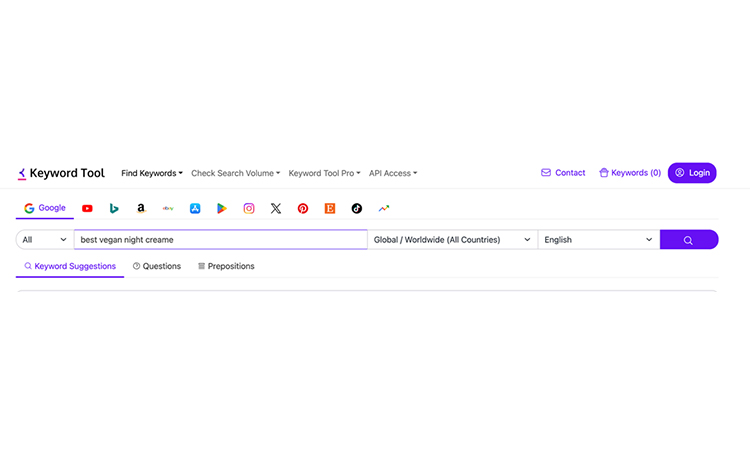
You can find less competitive and less expensive keywords for your PPC campaigns. The tool provides keyword ideas for Google, YouTube, Bing, and other platforms in one place. It is easy to use and requires no complex setup. You can find question-based keywords that frequently have higher conversion rates for PPC advertising, as well as negative keywords to eradicate.
Write your seed keyword in the search bar and get these comprehensive keyword ideas-
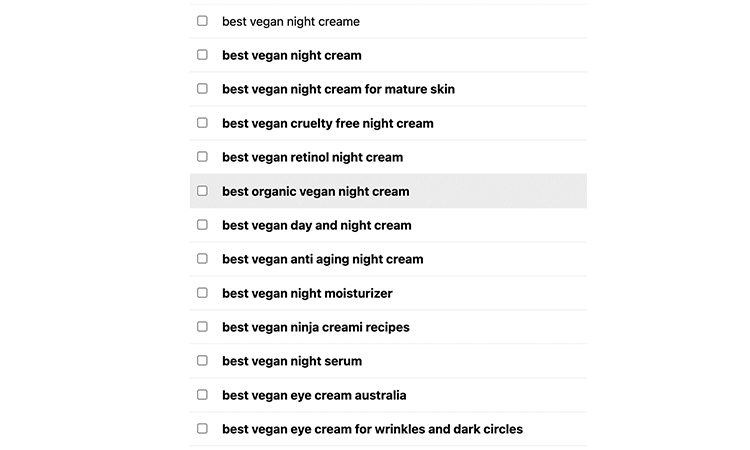
- Moz Keyword Explorer
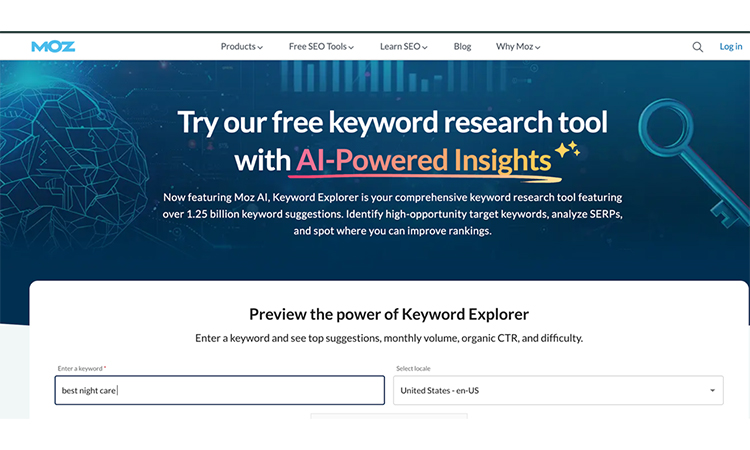
For PPC keyword research, Moz Keyword Explorer is the best tool because it gives you accurate data on search volume and keyword difficulty scores, which help you find profitable keywords with low competition. Its SERP analysis reveals competitor strategies, while the “Priority” metric combines volume, difficulty, and CTR data into one score. Technical features include API integration, bulk keyword analysis, and advanced filtering options.
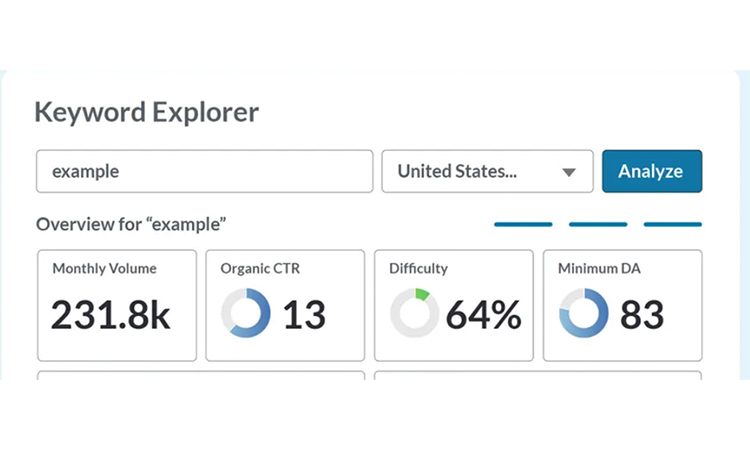
- Answer The Public
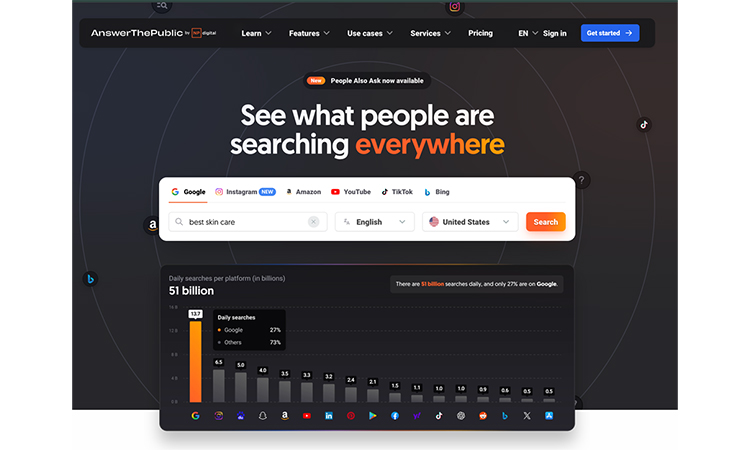
Answer The Public is preferred for PPC keyword research because it shows real user questions, search terms, and intent-based queries. It helps you find long-tail keywords that help you target better, spend less money on ads, and get a better return on investment when you run a campaign. Advertisements can be more relevant and effective when marketers look beyond generic keywords to find hidden opportunities. It helps you make sure that your pay-per-click (PPC) campaigns are in line with how people search.
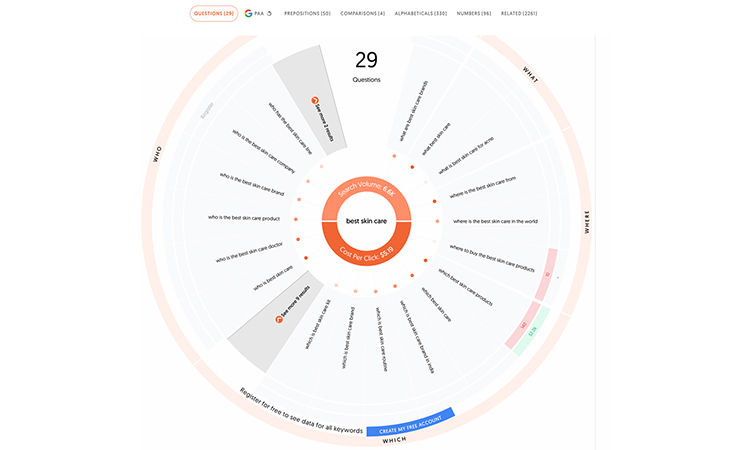
You can get all related questions in detail like this-
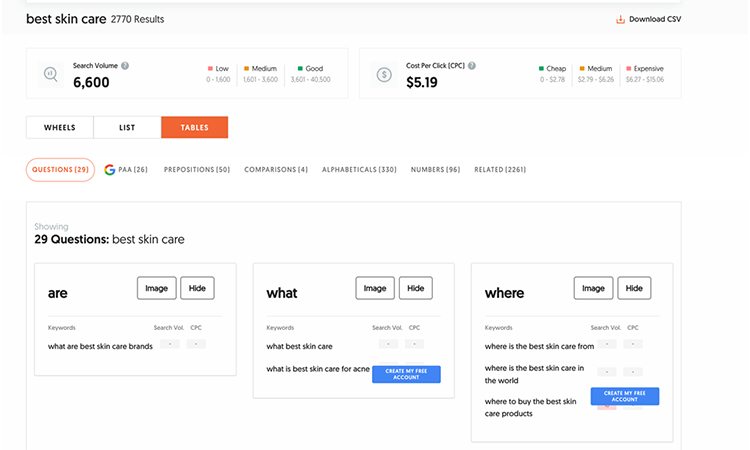
- Wordtracker Scout (free version)
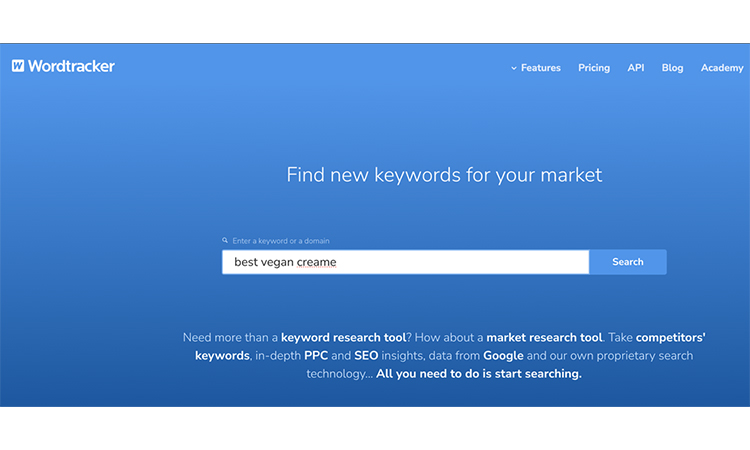
The free version of Wordtracker Scout makes PPC keyword research simple. It provides precise competitor keywords and immediate recommendations and is an easy-to-use, cost-free browser extension. No matter what website you visit, you can quickly find useful PPC keyword ideas that will help your paid ad strategy. Just add your seed keywords to the search bar and get the keyword list like this-
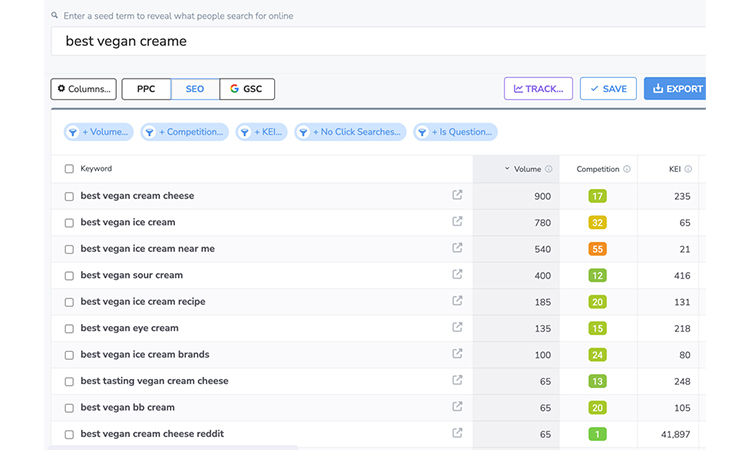
- Keyword Sheeter
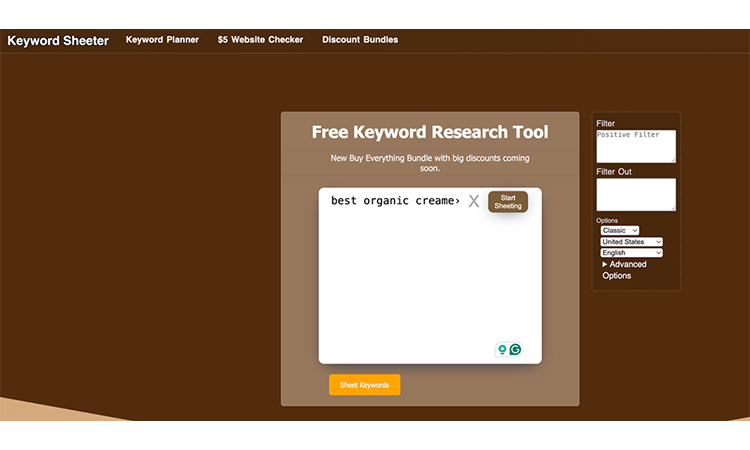
Keyword Sheeter is great for PPC keyword research because it quickly forms thousands of long-tail keywords from Google’s autocomplete data. It gets search suggestions based on what real people type, which means that keywords are very useful for PPC campaigns. The tool extracts keywords at scale without API limits, providing fresh data directly from Google’s servers. You can export a lot of keywords at once using its easy-to-use interface, which is excellent for making long PPC keyword lists. When you use autocomplete, you can see what people are searching for and what they want, which is significant for PPC advertising and ad relevance.
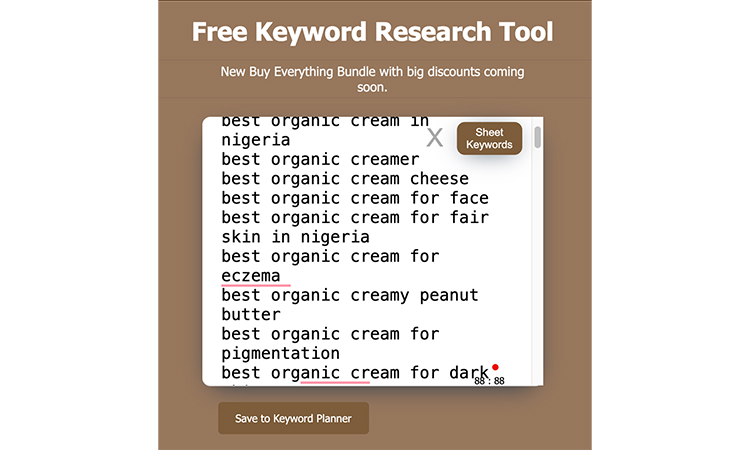
What Advanced Strategies Should You Use That Your Rivals Miss?
Till now, you have learned the steps of PPC keyword research and the top 10 ppc tools to find ppc keywords. And now you will discover some extraordinary strategies to make your ppc campaign more effective.
Best AI Tools for PPC Long-Tail Keywords
You can take help from artificial intelligence tools to find new keyword ideas. This strategy can make you one step further than your rivals, who only use traditional keyword research tools.
- ChatGPT (OpenAI)
This is great for brainstorming long-tail keywords for seed keywords.

Prompt Idea:
“Generate 20 long-tail PPC keyword ideas for a skincare brand selling organic beauty products. Focus on buyer intent and commercial search terms.”
You can use this prompt in any AI tool to generate new keyword ideas. The following are the best AI tools to find relevant keywords.
- Jasper AI- This AI will help you write ads and find specific keyword ideas related to your services.
- Copy.ai- It will develop a PPC keyword list according to user queries.
- Frase.io- AI tool for SERP & search intent analysis, useful for expanding keyword lists.
- Scalenut- Provides AI-powered keyword clustering for PPC campaigns.
- Surfer SEO + AI Integration- Helps find content-driven keyword suggestions for PPC coordination.
Intent-Stage Targeting (Beyond Branded and Bottom-Funnel Focus)
Most pay-per-click (PPC) campaigns only use brand names and keywords that people are ready to buy. You can get more potential customers throughout their buyer journey, though, by targeting different stages of intent. Top-funnel keywords target people finding problems, while middle-funnel terms reach those comparing solutions. Through multiple touchpoints, this strategy raises brand awareness early on and keeps prospects interested. If you focus on informational queries like “how to” or “best ways,” you can reach people before your competitors do. This makes the sales funnel bigger and lowers the overall cost of acquisition.
Voice and Mobile Conversational Related Keywords
Voice searches don’t use short typed queries but instead use natural, conversational language. People ask complete questions like “Where can I find cheap running shoes near me?” rather than typing “cheap running shoes.” Mobile users also favor more detailed searches. These keywords often include question words (who, what, where, when, how) and local intent phrases. Smart speakers and mobile devices that use voice search can be used to find your business if you use conversational keywords. As voice searches continue to grow quickly across all demographics, this approach is important.
When and How to Scale Your Keyword Research Strategy?
- After at least 3 months of steady performance and consistent profitability from your current campaigns, scale your keyword research. You need to prioritize a strong return on ad spend, high conversion rates, and a low cost-per-click before growing. Using broad match keywords can expose PPC campaigns to irrelevant search terms and waste budget if not managed carefully.
- You could target people all over the world by translating popular keywords into other languages and making changes to them so they work in different markets. Incorporating consumer insights from reviews and surveys helps align PPC keywords with actual consumer search behavior.
- Local targeting is good for service businesses because it helps them use keywords that are successful in nearby cities and regions. Grouping keywords by theme allows for writing more relevant ad copy, which enhances Quality Score.
- Test small budgets first, keep a close eye on how they’re doing, and slowly expand your expenses based on facts, not guesses.
Where Can You Apply This Keyword List for Maximum PPC Impact?
- Google Ads Search Campaigns—To get appropriate ad copy for high-intent keywords, use exact match, phrase match, and broad match modifiers.
- Microsoft Advertising (Bing)— You can use the same list of keywords to get more search traffic, often with less competition and lower costs.
- Google Shopping Campaigns—For better product visibility, use keywords in the titles, descriptions, and negative keyword lists.
- YouTube Ads—Target video campaigns using your keyword list to reach users searching for related content on the platform.
- Amazon PPC—You can use keywords to sponsor products, brands, and display campaigns for e-commerce businesses selling on Amazon.
- Facebook and LinkedIn Ads—Keywords can help you target people based on their interests and find people who search in the same way you do.
- Display Network Campaigns—For more brand awareness, go after websites and groups of people that are related to your search terms.
- Local Service Ads—Apply location-based keywords for service businesses targeting specific geographic areas.
- App Store Optimization— Furthermore, you need to include keywords in the Titles and descriptions of mobile apps to optimize them and make them easier to find.
Which Common PPC Keyword Research Mistakes You Should Avoid?
- Using Only Broad Match Keywords—Stop spending money on useless search queries that do not convert. So you need to use precise phrases to have more control over your adverts.
- Ignoring Negative Keywords—If you offer expensive items, don’t allow your advertising to appear for web searches like “free” or “cheap.” So you have to update your negative keywords frequently to save money.
- Keyword Stuffing in Ad Copy—Don’t cram too many keywords into ads. Therefore, you should focus on natural, persuasive copy that matches user search queries.
- Not Matching Landing Pages—Avoid sending users to generic pages. Your landing page content should directly relate to their original search queries.
- Bidding on Competitor Brand Names: This often results in low-quality scores and excessive expenses. However, you can work on your own branded keywords initially.
- Setting and Forgetting Campaigns—Do not overlook search result reports. You have to monitor and identify new keyword potential and ineffective expenses.
- Utilizing Single Keyword Ad Groups—Combine search terms that are related to make your ads more relevant and raise your Quality Score.
Frequently Asked Question-PPC Keyword Research
PPC isn’t always tougher than SEO; it’s just different. PPC provides rapid benefits but needs ongoing budgeting and monitoring. SEO takes months to produce results, but it gives long-term organic traffic without further investments.
PPC costs vary widely based on industry and competition. Small businesses typically spend $1,000-$10,000 monthly. For 12 months, expect $12,000-$120,000 depending on your goals, industry, and target market size.
PPC advertising may provide returns within hours after launch. However, optimization takes 2-3 months to collect enough data for real changes. Full campaign maturity usually develops within 6 months.
Let’s Quickly Draw a Conclusion
Here, we are at the end of our discussion of PPC keyword research. In the PPC campaigns, you have to always target high-value keywords to make your potential clients click on your ads and increase the chances of conversion. Remember to continuously monitor and optimize your keyword strategy to ensure maximum ROI for your PPC campaigns.
Running a PPC campaign is a little bit like a game of chess—you need to think strategically and stay one step ahead of your competition. So, you need to analyze the performance of your keywords and make adjustments as needed. You can stay on top of the game and bring success to your business. Therefore, you need to take help from any PPC management company who can provide important perspectives. If you get their assistance, you can navigate the complexities of PPC campaigns and make informed decisions that will generate results for your business.
So don’t wait too much; do thorough PPC keyword research and find high-value keywords that convert extremely well for your brand.


